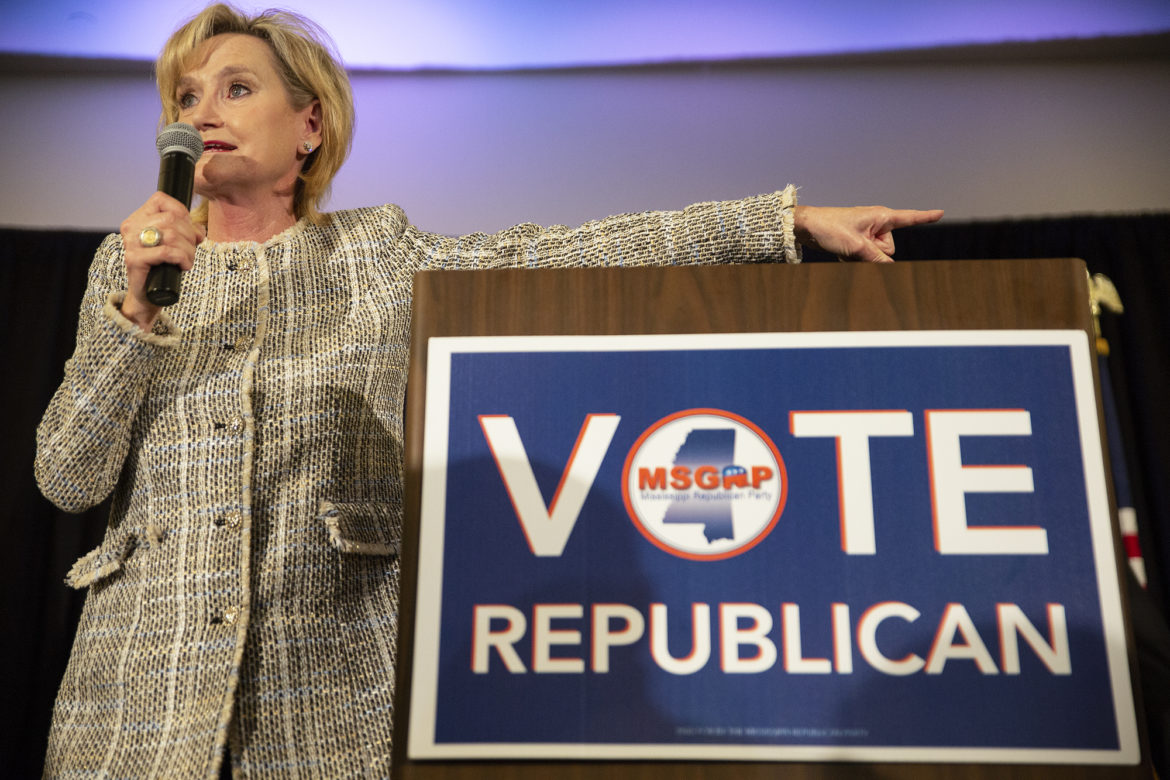Mississippi Today
Senate chairman 'extremely disappointed' by Hyde-Smith's effort to block judicial nomination

Senate chairman ‘extremely disappointed' by Hyde-Smith's effort to block judicial nomination
A spokesperson for U.S. Senate Judiciary Committee Chair Dick Durbin, a Democrat from Illinois, said is he “extremely disappointed” with Sen. Cindy Hyde-Smith's effort to block the nomination of Scott Colom of Columbus as a federal judge for the Northern District of Mississippi.
The question is whether that disappointment could result in Durbin ignoring Hyde-Smith's objections and taking up the nomination of Colom, a state district attorney for an area of northeast Mississippi.
“Chair Durbin has continually reminded his colleagues that it is imperative they engage with the White House in good faith to advance district court nominees — just as he did when former President Trump was in the White House,” said Emily Hampsten, a spokesperson for Durbin, who also is the majority whip.”He is extremely disappointed in Sen. Hyde-Smith's lack of communication and ultimate obstruction of a highly qualified nominee. In the coming days, he'll be assessing and will respond more fully.”
Hyde-Smith threw a wrench in the Senate confirmation of President Joe Biden's nomination of Colom when she refused to return the so-called “blue slip.” Under unwritten Senate rules, refusal of either home state senator to return a blue slip signaling approval of a presidential appointee has at times blocked nominees to the federal bench.
While Hyde-Smith refused to return the blue slip of Colom, Mississippi's senior U.S. Sen. Roger Wicker did, signaling his approval.
For most of the 20th century, the refusal to return the blue slip has not been an absolute in blocking nominations. Various groups and politicians, including U.S. Rep. Bennie Thompson of the 2nd District of Mississippi, have urged Durbin to forgo the unwritten rule that refusal by a home state senator to return the blue slip blocks the nomination.
While Durbin has not said exactly how he will approach the Colom nomination, a spokesperson for the Senate Judiciary Committee noted that Democrats returned 130 blue slips during the tenure of Republican President Donald Trump. And Durbin himself returned eight blue slips during Trump's presidency.
The Colom instance illustrates how partisan and polarizing the federal judicial appointment process — and congressional governing at large — has become. Hyde-Smith, a staunch conservative Republican, invoked several hot-button political issues in her statement about the Democratic district attorney's record of service in Mississippi.
“I visited with the district attorney recently, and I recognize that he is smart and well liked in his district,” Hyde-Smith said in a statement Tuesday. “However, there are a number of concerns I have regarding his record. As someone with a strong interest in protecting the rights of girls and women, I am concerned about Scott Colom's opposition to legislation to protect female athletes.”
Hyde-Smith seems to be referring to a letter Colom signed condemning the criminalization of gender-affirming care, rejecting the prosecution of the families of transgender individuals seeking treatment to help them transition. He and dozens of other prosecuting attorneys made the statement in the aftermath of an onslaught of legislation across the country attempting to block trans youth from receiving the care.
While the letter did condemn anti-trans legislation generally, the prosecutors' statement did not discuss “legislation to protect female athletes,” which refers to attempts to prohibit trans women from competing in women's sports. There is no public record of Colom taking a stance on trans women competing in women's sports.
In her statement about refusing to support Colom's nomination, Hyde-Smith also said: “The significant support his campaign received from George Soros also weighs heavily against his nomination in my view. I simply cannot support his nomination to serve on the federal bench in Mississippi for a lifetime.”
Soros, a New York billionaire who has advocated for various criminal justice reforms and for other progressive and governmental transparency causes, did provide funds in support of the Colom campaign through a political action committee in 2015 when he was first elected district attorney. But Colom did not receive support from Soros in 2019 when he ran for reelection.
Soros has become a pariah among national Republicans. Hyde-Smith's statement about Colom came on the same day Trump appeared in New York state court on a 34-count indictment for falsifying business records in a scheme during his 2016 presidential campaign to conceal that he'd had an affair with an adult film star.
Following the charges, Trump and many of his supporters attributed the probe to Soros, who supported the Manhattan district attorney Alvin Bragg leading the case.
Colom, when reached by Mississippi Today, declined to comment on Hyde-Smith's refusal to support his nomination. Federal judges receive a lifetime appointment. Colom was nominated by Biden to replace Mike Mills, who is stepping down from full-time service on the judiciary.
Despite Hyde-Smith's partisan objections to Colom's appointment, Colom had received endorsement letters and support from numerous Mississippians who had worked with him in his role as chief prosecutor of the 16th Circuit Court District.
The mother and the sister of James “Fluffy” White, a Clay County man who was murdered in 2015, submitted a letter to the Judicial Committee praising Colom for his successful prosecution of the man accused of murdering their loved one.
“Prior to trial, Mr. Colom's staff regularly communicated with us and kept us informed about the legal process and what to expect. We also personally observed Mr. Colom prosecute Roderick Johnson, the person arrested for shooting and killing Fluffy, and his knowledge of the law and legal procedure were impressive during the trial as was his passion for justice for Fluffy. As a result of his and his team's hard work, Mr. Johnson was found guilty and sentenced to life in prison.
“Based on our observations and experience with Mr. Colom, we have no doubt he would be a well-informed, ethical, fair and independent judge,” the women wrote.
Rhea Ann Pace detailed how Colom successfully prosecuted the man who murdered her daughter and shot her 4-year-old grandson multiple times.
“After the trial, Scott created a college savings plan for my grandson…and for the last four years he has been putting money in that plan so that when he graduates high school he can go to college,” she wrote to the Judiciary Committee. “To me this goes well beyond the scope of a district attorney. This makes him a man who truly cares about the people in his district.”
READ MORE: Biden's pick for US Attorney, in charge of welfare probe, gets approval from Mississippi senators
This article first appeared on Mississippi Today and is republished here under a Creative Commons license.
Did you miss our previous article…
https://www.biloxinewsevents.com/on-this-day-in-1915/
Mississippi Today
On this day in 1951


April 28, 1951

Ruby Hurley opened the first permanent office of the NAACP in the South.
Her introduction to civil rights activism began when she helped organize Marian Anderson's 1939 concert at the Lincoln Memorial. Four years later, she became national youth secretary for the NAACP. In 1951, she opened the organization's office in Birmingham to grow memberships in Alabama, Florida, Georgia, Mississippi and Tennessee.
When she arrived in Mississippi, there were only 800 NAACP members. After the governor made remarks she disagreed with, she wrote a letter to the editor that was published in a Mississippi newspaper. After that step in courage, membership grew to 4,000.
“They were surprised and glad to find someone to challenge the governor,” she told the Chicago Defender. “No Negro had ever challenged the governor before.”
She helped Medgar Evers investigate the 1955 murder of Emmett Till and other violence against Black Americans. Despite threats, she pushed on.
“When you're in the middle of these situations, there's no room for fear,” she said. “If you have fear in your heart or mind, you can't do a good job.”
After an all-white jury acquitted Till's killers, she appeared on the front cover of Jet magazine with the headline, “Most Militant Negro Woman in the South.”
Months later, she helped Autherine Lucy become the first Black student at the University of Alabama.
For her work, she received many threats, including a bombing attempt on her home. She opened an NAACP office in Atlanta, where she served as a mentor for civil rights leader Vernon Jordan, with whom she worked extensively and who went on to serve as an adviser to President Bill Clinton.
After learning of Evers' assassination in 1963, she became overwhelmed with sorrow. “I cried for three hours,” she said. “I shall always remember that pool of blood in which he lay and that spattered blood over the car where he tried to drag himself into the house.”
She died two years after retiring from the NAACP in 1978, and the U.S. Post Office recognized her work in the Civil Rights Pioneers stamp series. In 2022, she was portrayed in the ABC miniseries, “Women of the Movement.”
This article first appeared on Mississippi Today and is republished here under a Creative Commons license.
Mississippi Today
Rare open negotiations occur on important Medicaid expansion issue
The curtain was pulled back last week for the first time in years on the Mississippi Legislature's often mysterious conferencing process.
A conference committee consists of three representatives and three senators appointed to try to reach agreement when the two chambers pass differing versions of the same bill. Last week, a conference committee formed to try to reach agreement on Medicaid expansion caused a stir by meeting in a public setting.
Even though the joint rules of the Mississippi Legislature call for an open conferencing process, the conferees seldom meet in public. They usually meet and negotiate their differences near the end of the session behind closed doors.
That was not always the case.
For a period in the late 1990s and early 2000s, the Legislature, under intense pressure from the Mississippi Press Association, made open conference committees the norm.
Some major issues have been played out in public conference committees. Notable open conferences include:
- The infamous, excruciatingly long special session in 2002 where businesses received more protection from lawsuits.
- Budget fights when Haley Barbour was governor when legislators often would reach an impasse in the negotiations process and spend the bulk of their time talking about their cars and eating candy.
- The major rewrite of the state's economic development package under then-Gov. Ronnie Musgrove called Advantage Mississippi.
- The Mississippi Adequate Education Program, which for decades has provided the state's share for the basic operation of local school districts. It was hammered out in an open conference process in 1997 even before the joint rules mandated the open process.
Then-state Sen. Musgrove and former House Speaker Billy McCoy deserve credit or blame, according to one's perspective, for proving the open conference process could work. When they chaired their respective chamber's education committees, they insisted on having an open conference process.
But in more recent years, open conference committees have been few and far between. The joint rule has been largely ignored.
The fact that the three House and three Senate conferees agreed to meet at least once in public on Medicaid expansion — one of the most pivotal issues facing the Legislature in recent years — drew considerable attention.
If nothing else, the open conference committee provided a raw and unedited view of how far apart the two chambers were at the time on an issue that would provide additional health care coverage to primarily the working poor.
The House wanted to provide coverage to those earning up to 138% of the federal poverty level, or about $20,000 annually for an individual, while the Senate had proposed providing coverage to those earning less than 100% of the federal poverty level, or about $15,000 per year.
According to various experts, the House plan would provide coverage to many more working Mississippians and cost less to the state than would the Senate plan. The reason for the lower cost to the state is that when expanding to 138%, the federal government will pay 90% of the costs and provide the state an additional roughly $700 million over two years as an enticement to expand.
Under the Senate plan, the federal government will pay 77% of the cost and offer no incentives. It is important to understand that in the expensive world of health care, the difference in 77% of the cost and 90% means tens of millions to Mississippi state coffers.
The House conferees repeatedly pointed out those numbers — their plan covering more at less cost — during last week's open conference committee.
One of the reasons legislators through the years have not been enamored with an open conference process is that it has often turned into efforts by the negotiators to sell their position to the public.
Once the open conference process starts, the side that feels the most comfortable with its position wants to meet more often in full view of the public to make sure the public understands where each side stands.
For whatever it is worth, the House conferees were more enthusiastic about continuing the open process after the initial Medicaid expansion conference committee.
And after that initial open conference, the Senate offered a compromise to cover those earning up to 138% of the federal poverty level — just as the House proposed.
This article first appeared on Mississippi Today and is republished here under a Creative Commons license.
Mississippi Today
Legislation to strip key power of PERS Board passes both chambers
Legislation that strips significant power from the board that governs the state's public employee pension program has passed both chambers of the Legislature.
Under the legislation set to go to Gov. Tate Reeves during the final days of the 2024 session, the Public Employees Retirement System Board would no longer have the authority to increase the contribution rate levied on governments (both on the state and local level) to help pay for the massive retirement system.
The legislation, which passed both chambers in recent days, was a reaction to the decision by the board to increase by 5% over a three-year period the amount local governments contribute to each employee's paycheck for their retirement. Under the PERS Board plan, the employer contribution rate would have been increased to 22.4% over three years, starting with a 2% increase on July 1.
The board said the increase was needed to ensure the long-term financial stability of the system that pays retirement benefits for most public employees on the state and local levels, including staff of local school districts and universities and community colleges.
City and county government officials in particular argued that the 5% increase would force them to cut government services and lay off employees.
Under the bill passed by the Legislature there still would be a 2.5% increase over five years — a .5% increase in the employer contribution rate each year for five years.
In addition, legislative leaders said they plan to put another $100 million or more in state tax dollars into the retirement system in the coming days during the appropriations process.
Under current law, the PERS Board can act unilaterally to increase the amount of money governmental entities must contribute to the system. But under the new bill that passed both chambers, the board can only make a recommendation to the Legislature on increasing the employer contribution rate.
The PERS Board also would be required to include an analysis by its actuary and independent actuaries on the reason the increase was needed and the impact the increase would have on governmental entities.
In the 52-member Senate, 14 Democrats voted against the bill. Only one House member voted against the proposal.
Sen. David Blount, D-Jackson, said the bill failed to address the financial issues facing the system. He said a permanent funding stream is needed.
Blount said, “You are moving in the wrong direction and weakening the system” with the bill the Legislature approved. “Is it painful? Is it going to cost more money? Yes, but we need to do it” to fix the system.
The system has assets of about $32 billion, but debt of about $25 billion. But Sen. Daniel Sparks, R-Belmont, and others argued that the debt was “a snapshot” that could be reduced by strong performance from the stock market. The system depends on its investments and contributions from employers and employees as sources of revenue.
The system has about 360,000 members including current public employees and former employees and retirees.
The legislation states that no changes would be made for current members of the system. The legislation does reference looking at possibly changing the system for new employees. But that would be debated in future legislative sessions.
The bill does not include an earlier House proposal to dissolve the PERS Board, which consists primarily of people elected by the members of the system, and replace them with political appointees.
This article first appeared on Mississippi Today and is republished here under a Creative Commons license.
-
Local News3 days ago
Sister of Mississippi man who died after police pulled him from car rejects lawsuit settlement
-
Mississippi Today3 days ago
At Lake High School in Scott County, the Un-Team will never be forgotten
-
Mississippi News7 days ago
Forest landowners can apply for federal emergency loans
-
Mississippi News1 day ago
One injured in Mississippi officer-involved shooting after chase
-
Mississippi News6 days ago
Cicadas expected to takeover north Mississippi counties soon
-
Mississippi News5 days ago
Viewers make allegations against Hatley teacher, school district releases statement – Home – WCBI TV
-
Mississippi News Video4 days ago
Vehicle struck and killed man lying in the road, Alcorn County sheriff says
-
Mississippi Today6 days ago
On this day in 1892




































